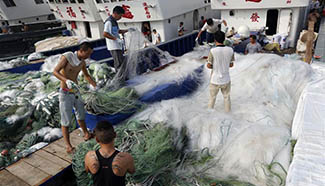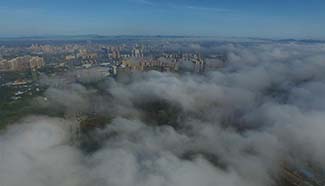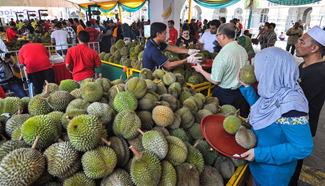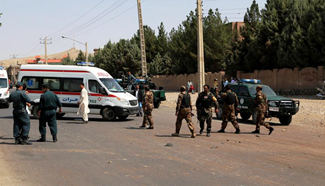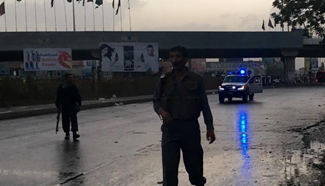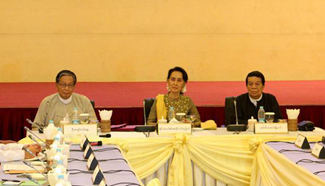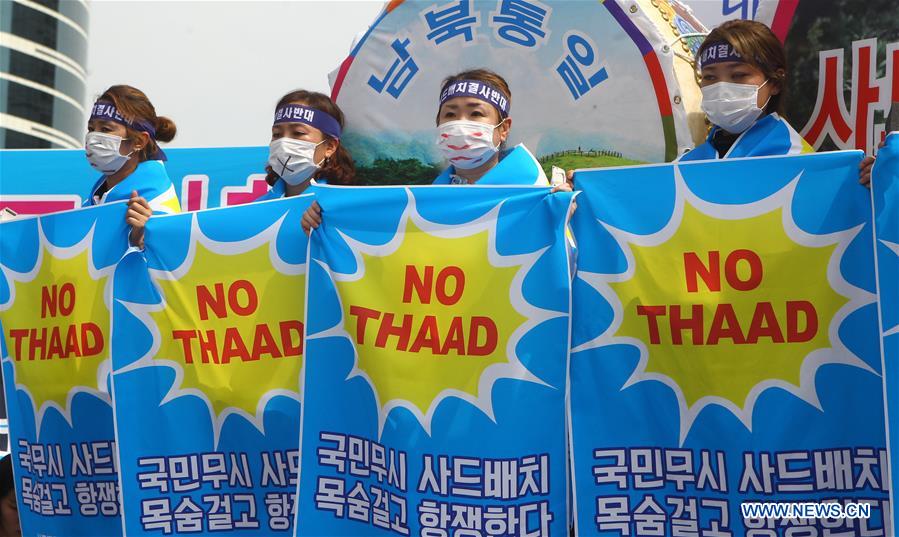
SEOUL, July 21, 2016 (Xinhua) -- People from Seongju county hold banners to protest against the deployment of the Terminal High Altitude Area Defense (THAAD), during a rally in Seoul, capital of South Korea, on July 21, 2016. More than 2,000 people from Seongju county, where one THAAD battery will be deployed, gathered at a square in Seoul for a rally on Thursday, to protest against the deployment of THAAD. (Xinhua/Yao Qilin)
by Xinhua writer Chen Shilei
BEIJING, July 30 (Xinhua) -- South Korea should stop playing with fire by hosting the U.S. anti-missile system on its own soil, as the move will not only isolate itself but also undermine regional stability.
Less than two weeks ago, South Korea and the United States reached the agreement to deploy the Terminal High Altitude Area Defense (THAAD) in the southern region of South Korea, despite continued opposition from neighboring nations.
Although the two countries claimed THAAD will not target any other third party but will be operated only in response to nuclear and missile threats from the Democratic People's Republic of Korea (DPRK), the deployment is no doubt a key step in the U.S. strategy of pivoting to Asia and will escalate tensions in Northeast Asia, especially on the Korean Peninsula.
It is believed that Seoul knows what the consequences of hosting THAAD are, but its siding with Washington for whatever reasons on THAAD shows its short-sightedness and poor diplomatic judgment.
While being useless in the face of the DPRK's short-range missiles and artillery, THAAD is already pushing the DPRK to be aggressive. The DPRK warned it would take "physical measures" and it test-fired three short-range ballistic missiles in a show of force against its southern neighbor's decision.
Escalating tensions on the peninsula will only shatter the Korean people's dream of peace and reunification, which will be the bitterest legacy of the Park Geun-hye government and the biggest misfortune of the Korean people.
Seoul's move will also damage its relations with China and Russia, and it will lose the two countries' support on the DPRK nuclear issue. Even worse, it will lose its independence when it comes to foreign policy making.
The reason why Beijing and Moscow firmly reject the missile defense system is that with the shield's X-band radar, Washington is able to peer conveniently into China and Russia, posing a grave threat to the security interests of the two countries and to regional peace.
Seoul's picking of a date to announce its decision ahead of the announcement of the award on the South China Sea arbitration is a severe misjudgment, assuming that China will be too occupied to respond to the deployment of THAAD. Such an irresponsible act on South Korea's part is eroding the strategic trust Beijing once placed in it.
Besides, the deployment of THAAD will adversely affect the economic and trade relations between South Korea and China, Seoul's largest trading partner.
Seoul has yet to fully understand that accepting the deployment of a missile shield will only let South Korea become the frontline for possible strategic confrontation between the world's major countries.
It is advisable that Seoul should seriously consider whether it would really benefit from a THAAD deployment and reconsider its dangerous move to avoid an escalation of regional tensions and safeguard hard-won peace and stability.
Related:
Chinese FM warns of adverse impact on Korean Peninsula by THAAD deployment
VIENTIANE, July 25 (Xinhua) -- Chinese Foreign Minister Wang Yi said deployment of the Terminal High Altitude Area Defense (THAAD) in South Korea will adversely impact the situation on the Korean Peninsula, regional stability and bilateral ties.
When meeting with his South Korean counterpart Yun Byung-se Sunday on the sidelines of an ASEAN foreign ministers' meeting in the Lao capital, Wang said the deployment of the advanced U.S. missile defense system will jeopardize mutual trust between the two countries. Full story
Commentary: New Cold War looms large in North East Asia as Seoul accepts THAAD
by Xinhua writer Liu Chang
BEIJING, July 29 (Xinhua) -- A new Cold War is looming large in Northeast Asia as Washington insists on installing an anti-missile shield in South Korea, a provocative move that could further split the region, trigger a fresh arms race and crush hopes of denuclearizing the Korean Peninsula.
Immediately after the Second World War, the U.S.-led Western bloc sought to dictate post-war world order and contain the Soviet Union to ensure global supremacy as well as the proliferation of capitalism and its set of values worldwide. And that was how the Cold War set in. Full story





